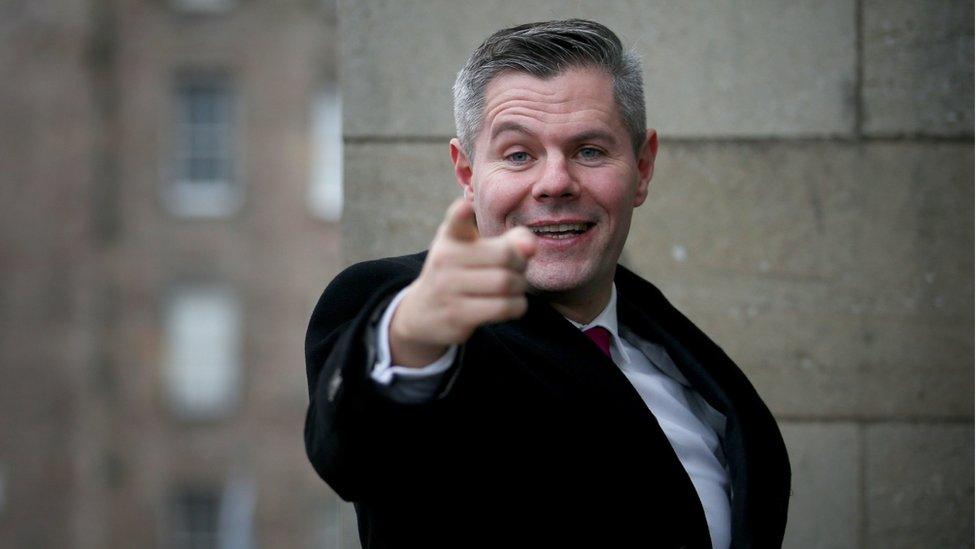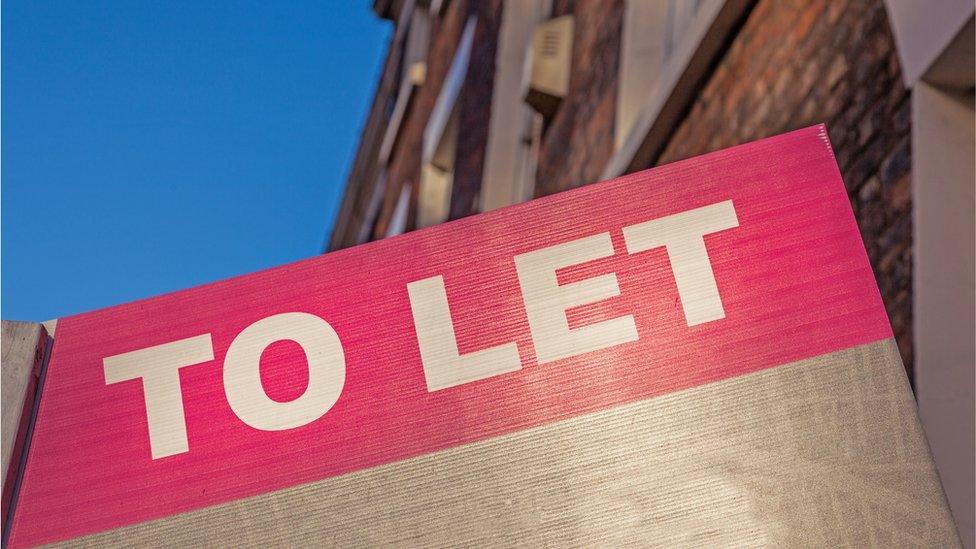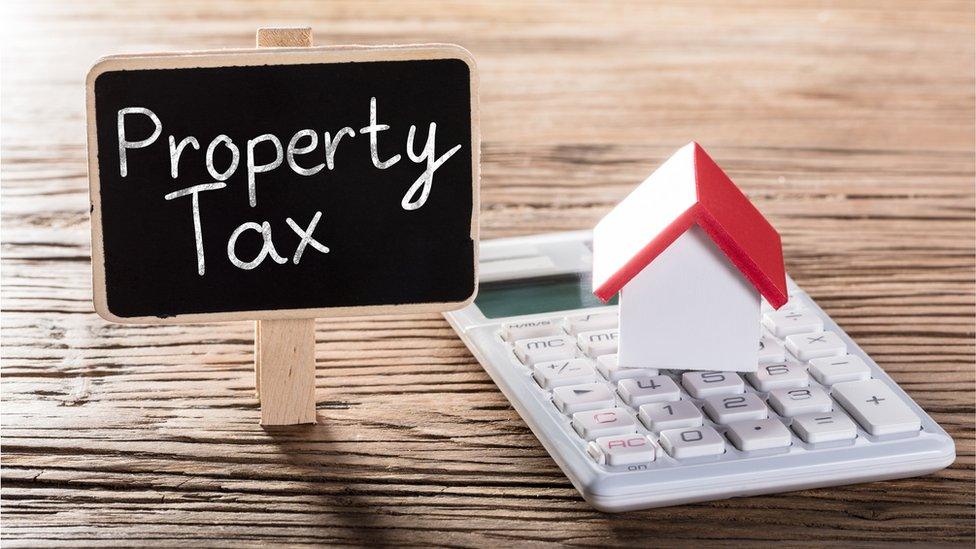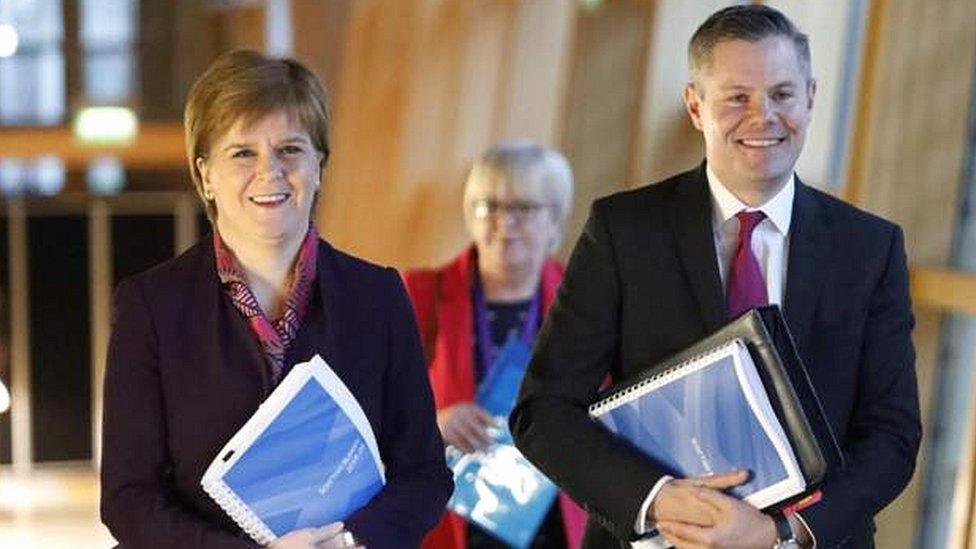Small change in Holyrood's budget
- Published
Last year saw radical change in the Scottish budget with very low growth. This year, the growth has picked up, and there's little change.
Complaints that austerity is still a drag on Scottish public services don't seem to square with real terms increases on budget heads.
The most obvious focus for Derek Mackay wishing to win friends were those in business, though in general, it still doesn't like higher income tax on higher earners.

This time last year, Derek Mackay was being the radical. The SNP's finance secretary tore up the income tax system to create a new one for Scotland, and set course for divergence from the Westminster line by dipping into higher earners' pockets.
At the same time, the Scottish Fiscal Commission delivered its first forecast for the Scottish economy, with an extremely gloomy 0.7% annual growth rate. That forecast matters because it's the one Derek Mackay has to use for his budgeting.
This year, the most notable tax measure was NOT to do something - not to change the threshold for paying the higher rate, sticking with those on at least £43,430.
This time, it's Phillip Hammond at Westminster who is being the fiscal radical - tearing up the Treasury orthodoxy of deficit reduction since 2010, and splurging extra cash on the health service.
As for growth, the Fiscal Commission has raised its hopes for the economy. This year looks like 1.4%, and next year 1.2%, followed in 1% in 2020 and still only 1.2% in 2023.
That's a big improvement on last year's forecast, but it's a long way from strong growth, and it remains subdued in later years.
It's closer to other forecasts, including the Fraser of Allander Institute this week. Last week, it was the EY Item Club of Scottish economists, which was issuing a similar middle-term warning. It said this year's growth has picked up a bit. It's been stronger than the UK. But there are factors weighing on future growth, including weak productivity and demographic shifts.
Giveaways
So what can be made of this Budget? Mainly that it was less about change, and more about sending political and some economic signals.
The scale of the budget changes was striking for being so small. That freeze on the threshold for higher rate income tax puts another 29,000 or so taxpayers into that category. In total, the Scottish Fiscal Commission reckons it could bring in an extra £68m.

The levy on buy-to-let home purchases has increased
Of that, £42m is going into a minor cut to business rates. To show the scale of those changes, bear in mind that the total take from income tax will be around £12bn, and £2.8bn from business rates.
Changes to Land and Buildings Transaction Tax (formerly Stamp Duty), including an increase for the extra levy charged on second and buy-to-let homes, brings in £39m more.
Meanwhile, the "giveaways" include £12m for a grant to help parents of young children, £6m in funeral grants and £4m to provide better food for children from poorer homes.
Childcare
As for other choices in this draft budget, the main factor is taking the additional money flowing from Phillip Hammond's belt-loosening decision into the Barnett formula for the Holyrood block grant, and doing the same thing as Westminster - putting it into the health service. Saying £55m seems to be missing, Mr Mackay says he's found enough to close that gap.
Indeed, he seems to have found money for increases to various big budget heads. His speech to MSPs claimed this would include police, education, the fiscal service, infrastructure, even local councils, which usually take the worst of the squeeze.

There's money, as you might expect mid-parliament, to push forward a couple of the really big changes that the SNP administration is seeking to achieve over quite a long period. That includes more childcare - requiring a lot of capital spend to ensure there's sufficient capacity - and merging the administration of social care with the health service.
As my colleague Gordon Brewer has pointed out, it's hard to square such a positive story with the claim that austerity is still stalking the land due to decisions made in Westminster.
As the Scottish Parliament Information Centre gives us one part of the answer. Local government is seeing an increase in real terms, but that includes capital and ring-fenced grants. Strip it down to the core funding for local government, already down in real terms by 8% since the start of the decade, and you can see a further cut of £319m, or 3.4%.
Green concessions
And what of the signals? One is that this is no time to be radical. The SNP is projecting itself as the party of governmental stability. Whereas it once fought for a space on the middle of politics, it now finds it has much of that space to itself, while Labour and Conservatives have shifted away from the centre or into other orbits altogether.
Another: the divergence from Westminster goes on, but very gradually loading more of the tax burden onto higher earners.
In connection with that, Derek Mackay is asking his economic advisers to gauge the risk of higher tax than England eventually leading to a loss of people and revenue. He already has the Fiscal Commission to do that, but the added signal helps him deal with attacks from Labour and the left, demanding higher tax rates on super-earners.

The Greens are demanding a more progressive property tax as the price of their support
A third signal: the SNP administration is listening to business. Many of the louder voices have been complaining about the divergence on income tax, and that may have contained the extent of that. Another big ask was not to implement an idea proposed by the Barclay Review of business rates - that an extra levy should be charged on out-of-town and online retailers. The retailers have seen that off.
Lots of small businesses have retained their zero rating on business rates, and Mr Mackay went further on two fronts; raising next year's bills by less than inflation, and linking them after that to the Consumer Price Index, a relatively low measure of price increases.
Signal number four: the continued starter rate for income tax has been raised with inflation, while business rates are going up by less than inflation - both measures letting Mr Mackay boast that Scotland is the lowest taxed part of the UK - albeit on some measures of his choosing, and by a small margin.
Is there a signal to Scottish Green MSPs that there's a deal to be done? That's less obvious, except for one paragraph in the budget document that says, first, that council tax should become more progressive and second, endorsing the view that "the current council tax system must end".
As the inter-party discussions have already been taking place, it's unlikely this draft budget package does not contain elements and gaps where the Greens will find Mr Mackay willing to make concessions and give Greens the credit.
- Published12 December 2018
